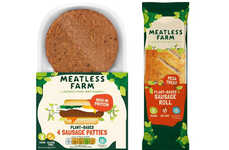
Simon Howie's New Product Puts a Plant-Based Spin on a Scottish Staple
Laura McQuarrie — October 4, 2018 — Lifestyle
References: thescottishbutcher & thescottishbutcher
Square sausage, also known as sausage slice or Lorne, is a traditional Scottish food that is usually made from a combination of minced meat, dry bread and spices. Simon Howie, aka The Scottish Butcher, recently launched a vegetarian version of the breakfast food as a completely meatless option for those who are interested in flexitarian eating.
It is said that "Simon Howie currently sells 13 tonnes of beef Lorne every week, equating to almost 10 million slices per year." Now, The Scottish Butcher is making its all-vegetarian version of the sausage available in Scottish supermarkets.
The plant-based square sausage is made with a base of soya and stands out as the third vegetarian product available from The Scottish Butcher; previously introduced products include others like Vegetarian Haggis and Wee Veggie haggis that also reinterpret classic Scottish fare.
It is said that "Simon Howie currently sells 13 tonnes of beef Lorne every week, equating to almost 10 million slices per year." Now, The Scottish Butcher is making its all-vegetarian version of the sausage available in Scottish supermarkets.
The plant-based square sausage is made with a base of soya and stands out as the third vegetarian product available from The Scottish Butcher; previously introduced products include others like Vegetarian Haggis and Wee Veggie haggis that also reinterpret classic Scottish fare.
Trend Themes
1. Flexitarian Sausages - Meatless versions of traditional meat-based breakfast sausages are an emerging trend that caters to flexitarian and plant-based diets.
2. Plant-based Scottish Fare - Innovative plant-based meat substitutes are becoming increasingly popular in traditional food industries, such as Scottish fare, as consumers become more health-conscious and sustainability-minded.
3. Vegetarian Butcher Products - The introduction of vegetarian versions of traditional meat products by well-established meat brands demonstrates how plant-based diets and lifestyles are influencing and disrupting food industry standards.
Industry Implications
1. Meat Processing - Meat processing companies can explore opportunities to expand their product lines by introducing vegetarian and plant-based meat substitutes to attract a wider range of consumers and meet changing market demands.
2. Supermarkets - Supermarkets can capitalize on the increasing popularity of plant-based eating by stocking vegetarian and flexitarian food options, including meat substitutes of popular traditional meat-based products.
3. Food Service - Food service companies and restaurants can cater to changing consumer tastes and preferences by offering innovative and healthy plant-based options, including vegetarian meat substitutes in traditional dishes like Scottish breakfasts.
0.6
Score
Popularity
Activity
Freshness























